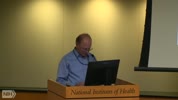-
- NIH VideoCast - BD2K All-Hands Grantee Meeting - November 2015 (Day 1)
-
- - NIH Office of the Associate Director for Data Science (2015/11/19)
- - Category : Conferences
- The BD2K 2015 All Hands Meeting will bring together researchers, educators, developers, and trainees from all of the BD2K initiative grants. The goals of the All Hands Grantee Meeting are to showcase research being conducted in the BD2K programmatic areas and build a cohesive BD2K consortium that maximizes synergies between participants. The meeting will also highlight the strategic mission of BD2K and the office of the Associate Director for Data Science.
For more information go to https://datascience.nih.gov/bd2k/events/NOV2015-AllHands
NIH VideoCast - BD2K All-Hands Grantee Meeting - November 2015 (Day 1)
-
- NIH VideoCast - BD2K All-Hands Grantee Meeting - November 2015 (Day 2)
-
- - NIH Office of the Associate Director for Data Science (2015/11/19)
- - Category : Conferences
- The BD2K 2015 All Hands Meeting will bring together researchers, educators, developers, and trainees from all of the BD2K initiative grants. The goals of the All Hands Grantee Meeting are to showcase research being conducted in the BD2K programmatic areas and build a cohesive BD2K consortium that maximizes synergies between participants. The meeting will also highlight the strategic mission of BD2K and the office of the Associate Director for Data Science.
For more information go to https://datascience.nih.gov/bd2k/events/NOV2015-AllHands
NIH VideoCast - BD2K All-Hands Grantee Meeting - November 2015 (Day 2)
-
- NIH VideoCast - Introduction to the Principles and Practice of Clinical Research (IPPCR): Measurement in Clinical Research
-
- - David Luckenbaugh, M.A., NIH (2015/11/19)
- - Category : IPPCR
- The Introduction to the Principles and Practice of Clinical Research (IPPCR) is a course to train participants on how to effectively conduct clinical research. The course focuses on the spectrum of clinical research and the research process by highlighting epidemiologic methods, study design, protocol preparation, patient monitoring, quality assurance, and Food and Drug Administration (FDA) issues.
For more information go to https://ippcr.nihtraining.com/login.php
NIH VideoCast - Introduction to the Principles and Practice of Clinical Research (IPPCR): Measurement in Clinical Research
-
- NIH VideoCast - Mechanisms for regulating of histone ubiquitination and acetylation by the SAGA complex
-
- - Cynthia Wolberger, Ph.D., Johns Hopkins University School of Medicine (2015/11/18)
- - Category : Neuroscience
- NIH Neuroscience Seminar Series
Protein function is dynamically regulated in the cell by the attachment and subsequent removal of covalent post translational modifications. Acetylation and ubiquitination both occur in chromatin, the nucleoprotein complex into which eukaryotic DNA is packaged. Acetylation of the histoneproteins in chromatin is associated with activation of transcription, whereasubiquitination can be either an activating or a repressive mark, depending onwhich histone protein is modified. Ubiquitination of chromatin also plays arole in the response to DNA double-strand breaks, helping to recruit proteinsthat are required for DNA repair. Dr. Wolberger???s lab is interested in themolecular basis for these events, which ensure the integrity and expression ofthe genome. They use x-ray crystallography, enzymology, cell-based assays and avariety of biophysical tools to gain insights into the mechanisms underlying these essential cellular processes.
NIH VideoCast - Mechanisms for regulating of histone ubiquitination and acetylation by the SAGA complex
-
- NIH VideoCast - Energy Hormesis and Your Health: A Different View of Energetics and Cancer
-
- - Henry J. Thompson, PhD, Colorado State University (2015/11/18)
- - Category : Stars in Nutrition
Stars in Nutrition and Cancer
The Stars lecture is titled "Energy Hormesis and Your Health: A Different View of Energetics and Cancer." A case studies approach will be used to explore the concept of energy hormesis and health with a specific focus on breast cancer. The topics considered will include: obesity and weight loss; energy restriction feasibility; energy restriction mechanisms; energy availability and stress; the impact of inherent versus induced aerobic capacity on cancer risk; and energy stress pharmacology.
For more information go to http://prevention.cancer.gov/news-and-events/meetings-and-events/energy-hormesis-and-your
NIH VideoCast - Energy Hormesis and Your Health: A Different View of Energetics and Cancer
-
- NIH VideoCast - 2015 Maurice B. Burg Lecture: Opening Doors Worldwide Through Medical Science
-
- - Peter C. Agre, M.D., Johns Hopkins Malaria Research Institute (2015/11/18)
- - Category : Special
- The major lesson I learned from a four-decade career in medical science is that we have a unique opportunity to make the world a better place. As a Johns Hopkins faculty member, our research group discovered the aquaporin water channels that facilitate the movement of water across cell membranes. This led to multiple international collaborations including studies with renal physiologists in Denmark, neuroscientists in Norway, structural biologists in Switzerland and Japan, and field workers in Africa. While the practical value of these discoveries is just emerging, valuable new preventive strategies and treatments for multiple disorders are anticipated, including renal failure, brain edema, blindness, wound healing, and infectious diseases. In addition to achievements in the laboratory and clinic, the human contacts we have developed have proven useful to address serious infringements of human rights and may even open doors to countries isolated by ideology or repressive regimes.
NIH VideoCast - 2015 Maurice B. Burg Lecture: Opening Doors Worldwide Through Medical Science
-
- NIH VideoCast - TRACO 2015: Functional Genomics - Precision Medicine
-
- - N. Caplen, NIH; C. Harris, NIH (2015/11/18)
- - Category : TRACO
- Functional genomics; Precision medicine
For more information go to http://ccr.cancer.gov//trainee-resources-courses-workshops-traco
NIH VideoCast - TRACO 2015: Functional Genomics - Precision Medicine
-
- NIH VideoCast - Introduction to the Principles and Practice of Clinical Research (IPPCR): Conceptual Approach to Survival Analysis
-
- - Laura Lee Johnson, Ph.D., FDA (2015/11/18)
- - Category : IPPCR
- The Introduction to the Principles and Practice of Clinical Research (IPPCR) is a course to train participants on how to effectively conduct clinical research. The course focuses on the spectrum of clinical research and the research process by highlighting epidemiologic methods, study design, protocol preparation, patient monitoring, quality assurance, and Food and Drug Administration (FDA) issues.
For more information go to https://ippcr.nihtraining.com/login.php
NIH VideoCast - Introduction to the Principles and Practice of Clinical Research (IPPCR): Conceptual Approach to Survival Analysis
-
- NIH VideoCast - Clinical Trial Designs for Emerging Infectious Diseases - Breakout Session (Day 2)
-
- - FDA (2015/11/17)
- - Category : Conferences
- The Ebola Virus Disease (EVD) epidemic has highlighted the importance of being able to rapidly evaluate investigational products during a public health emergency, including in resource limited settings. It is generally agreed that access to early investigational interventions that have not yet been well characterized should be provided in a setting that allows for the reliable assessment of benefits and harms. Ascertaining the safety and efficacy of an investigational product is an important step that is necessary to protect and promote the public health now and in the future. A critical aspect of the response effort is the ability to rapidly establish and conduct clinical trials that are both scientifically valid and ethically appropriate. During the course of the EVD epidemic, there has been significant debate over the design of trials to evaluate investigational therapies and vaccines. Among the trial designs employed during the EVD epidemic to evaluate experimental therapeutics were (1) open-label product administration compared to historical controls, and (2) randomized open-label product administration compared to concurrent ???standard of care??? controls. Among the proposed trial designs for EVD vaccines are (1) randomized controlled trials, (2) clustered randomized trials, (3) stepped wedge trials, and (4) ring vaccination trials. Trials to support alternative licensure pathways under FDA regulations, such as accelerated approval or the animal rule, have also been proposed. Advocates cited a range of scientific, ethical and practical concerns for and/or against each of these (and other) trial designs for investigational products. Based on our experience, positive and negative, in designing and conducting clinical trials for EVD, it is important to bring the various stakeholders together to explore the lessons learned, and how we may be better prepared to deploy investigational products in the setting of the next epidemic of an emerging infectious disease (EID).
NIH VideoCast - Clinical Trial Designs for Emerging Infectious Diseases - Breakout Session (Day 2)
-
- NIH VideoCast - Clinical Trial Designs for Emerging Infectious Diseases (Day 1)
-
- - FDA (2015/11/15)
- - Category : Conferences
- The Ebola Virus Disease (EVD) epidemic has highlighted the importance of being able to rapidly evaluate investigational products during a public health emergency, including in resource limited settings. It is generally agreed that access to early investigational interventions that have not yet been well characterized should be provided in a setting that allows for the reliable assessment of benefits and harms. Ascertaining the safety and efficacy of an investigational product is an important step that is necessary to protect and promote the public health now and in the future. A critical aspect of the response effort is the ability to rapidly establish and conduct clinical trials that are both scientifically valid and ethically appropriate. During the course of the EVD epidemic, there has been significant debate over the design of trials to evaluate investigational therapies and vaccines. Among the trial designs employed during the EVD epidemic to evaluate experimental therapeutics were (1) open-label product administration compared to historical controls, and (2) randomized open-label product administration compared to concurrent ???standard of care??? controls. Among the proposed trial designs for EVD vaccines are (1) randomized controlled trials, (2) clustered randomized trials, (3) stepped wedge trials, and (4) ring vaccination trials. Trials to support alternative licensure pathways under FDA regulations, such as accelerated approval or the animal rule, have also been proposed. Advocates cited a range of scientific, ethical and practical concerns for and/or against each of these (and other) trial designs for investigational products. Based on our experience, positive and negative, in designing and conducting clinical trials for EVD, it is important to bring the various stakeholders together to explore the lessons learned, and how we may be better prepared to deploy investigational products in the setting of the next epidemic of an emerging infectious disease (EID).
NIH VideoCast - Clinical Trial Designs for Emerging Infectious Diseases (Day 1)
-
- NIH VideoCast - Principles of Clinical Pharmacology ~ Pathways of Drug Metabolism
-
- - Dr. Sanford P. Markey, NIST (2015/11/14)
- - Category : Principles of Clinical Pharmacology
- The "Principles of Clinical Pharmacology" course is a weekly lecture series covering the fundamentals of clinical pharmacology as a translational scientific discipline focused on rational drug development and utilization in therapeutics. The course is offered annually at the NIH Clinical Center and runs from September through April.
NIH VideoCast - Principles of Clinical Pharmacology ~ Pathways of Drug Metabolism
-
- NIH VideoCast - Immune reconstitution syndrome in HIV infection: from bedside to bench
-
- - Irini Sereti, M.D., Chief, HIV Pathogenesis Unit, Laboratory of Immunoregulation, NIAID, NIH (2015/11/14)
- - Category : NIH Director`s Seminars
Director`s Seminar Series
HIV infection leads to CD4 lymphopenia and immunosuppression, which can be successfully improved with antiretroviral therapy (ART) but approximately 20 percent of HIV patients initiating ART may develop an aberrant immune response known as immune reconstitution inflammatory syndrome (IRIS). IRIS encompasses the paradoxical worsening of the manifestations of underlying opportunistic diseases (paradoxical IRIS) or the abrupt or atypical presentation of previously occult opportunistic disease (unmasking IRIS) in patients who recently started ART. Importantly, IRIS or paradoxical reactions seem to expand beyond HIV representing a dysregulation of immune responses when immune suppression is abruptly reversed.Our group is studying the clinical predictors, biomarkers and pathogenesis of IRIS through a comprehensive translational program with the aim to develop better strategies for prevention and treatment.
NIH VideoCast - Immune reconstitution syndrome in HIV infection: from bedside to bench
-
- NIH VideoCast - PRAT 50th Anniversary Scientific Symposium 2015
-
- - NIGMS, NIH (2015/11/13)
- - Category : Conferences
- The National Institute of General Medical Sciences Postdoctoral Research Associate (PRAT) Program will host a Scientific Symposium in honor of the 50th Anniversary of the PRAT Program. This is an all-day event in the Ruth L. Kirschstein Auditorium of the Natcher Conference Center (Building 45) and is open to the public. Over it`s 50-year history, the PRAT Program has trained numerous leaders in academia, government and industry, and across many different scientific disciplines. This scientific symposium will recognize and highlight the major scientific contributions of PRAT alumni to a variety of diverse research areas in the basic biomedical sciences.
For more information go to https://meetings.nigms.nih.gov/Home/Index/19247
NIH VideoCast - PRAT 50th Anniversary Scientific Symposium 2015
-
- NIH VideoCast - Infectious Disease Research: Quantitative Methods and Models in the era of Big Data (Day 1)
-
- - NIAID, NIH (2015/11/13)
- - Category : Conferences
- The purpose of this workshop is to bring together quantitative methods researchers in infectious diseases in order to exchange ideas on the latest topics in infectious disease research and to provide a forum for rich discussion and future directions. The application areas that will be covered include methods to study spread of infectious agents (HIV, malaria, TB, HCV, dengue, etc.) and the interaction of these agents with hosts as well as the impact of prevention and treatment interventions.
NIH VideoCast - Infectious Disease Research: Quantitative Methods and Models in the era of Big Data (Day 1)
-
- NIH VideoCast - Danger-based immunology course, session seven: parasites
-
- - Polly Matzinger, NIH (2015/11/13)
- - Category : Special
- This is the seventh session of the immunology course based on the Danger model. in it we will discuss the influence of parasites on immune responses. as alan sher puts it, parasites and pathogens are the best immunologists, having had evolutionary time to figure us out.
NIH VideoCast - Danger-based immunology course, session seven: parasites
-
- NIH VideoCast - TRACO 2015: Stem Cells - Epigenetics
-
- - D. Salomon; M. Verma (2015/11/13)
- - Category : TRACO
- Stem cells; Epigenetics
For more information go to http://ccr.cancer.gov//trainee-resources-courses-workshops-traco
NIH VideoCast - TRACO 2015: Stem Cells - Epigenetics
-
- NIH VideoCast - Infectious Disease Research: Quantitative Methods and Models in the era of Big Data Statistical Workshop (Day 2)
-
- - NIAID, NIH (2015/11/13)
- - Category : Conferences
- The purpose of this workshop is to bring together quantitative methods researchers in infectious diseases in order to exchange ideas on the latest topics in infectious disease research and to provide a forum for rich discussion and future directions. The application areas that will be covered include methods to study spread of infectious agents (HIV, malaria, TB, HCV, dengue, etc.) and the interaction of these agents with hosts as well as the impact of prevention and treatment interventions.
NIH VideoCast - Infectious Disease Research: Quantitative Methods and Models in the era of Big Data Statistical Workshop (Day 2)
-
- NIH VideoCast - Principles of Clinical Pharmacology ~ Population Pharmacokinetics
-
- - Dr. Raymond Miller (2015/11/11)
- - Category : Principles of Clinical Pharmacology
- The "Principles of Clinical Pharmacology" course is a weekly lecture series covering the fundamentals of clinical pharmacology as a translational scientific discipline focused on rational drug development and utilization in therapeutics. The course is offered annually at the NIH Clinical Center and runs from September through April.
NIH VideoCast - Principles of Clinical Pharmacology ~ Population Pharmacokinetics
-
- NIH VideoCast - Dissecting computations in the dopamine reward circuit
-
- - Nao Uchida, Ph.D., Harvard University (2015/11/11)
- - Category : Neuroscience
NIH Neuroscience Seminar Series
The ability of efficiently acquiring sensory information and selecting an appropriate action is the essence of flexible behaviors. To make good decisions, it is also crucial to evaluate the consequences of previous actions (gains and costs) and adjust strategies for future decisions. Dr. Uchida???s laboratory is interested in neuronal processes by which sensory information and memory about previous experiences guide behavior of the animal. Their main questions are: 1) How is odor information coded and processed by an ensemble of neurons? 2) What kinds of circuit dynamics underlie decision-making processes? 3) What are the mechanisms for learning based on rewards and punishments? They have developed an odor-guided perceptual decision task in rats and mice. This behavioral paradigm was recently combined with a multi-electrode recording technique (tetrodes) which allows them to monitor activity of multiple neurons simultaneously while animals are performing a behavioral task. Particular emphasis will be made on the use of behavior. First, behavioral paradigms specify computations (e.g. extracting relevant information in the sensory stimulus) and behavioral goals (e.g. maximizing rewards in a certain period) to be achieved. This in turn guides the way neuronal activities are analyzed. Furthermore, behavioral experiments are necessary to test relevance of certain activity of neurons or hypothesis about "neural codes" obtained in neuronal recordings. They will use various molecular and genetic tools available in mice to further test specific hypotheses experimentally. By combining the above approaches, they wish to establish a causal link between activity of specific neuronal circuits and the dynamics of behavior and learning.
NIH VideoCast - Dissecting computations in the dopamine reward circuit
-
- NIH VideoCast - Introduction to the Principles and Practice of Clinical Research (IPPCR) 2015: Sample Size and Power
-
- - Laura Lee Johnson, Ph.D., FDA (2015/11/11)
- - Category : IPPCR
- The Introduction to the Principles and Practice of Clinical Research (IPPCR) is a course to train participants on how to effectively conduct clinical research. The course focuses on the spectrum of clinical research and the research process by highlighting epidemiologic methods, study design, protocol preparation, patient monitoring, quality assurance, and Food and Drug Administration (FDA) issues.
For more information go to https://ippcr.nihtraining.com/login.php
NIH VideoCast - Introduction to the Principles and Practice of Clinical Research (IPPCR) 2015: Sample Size and Power






















